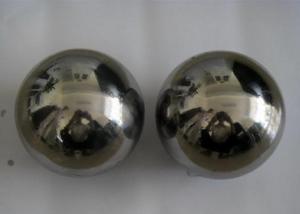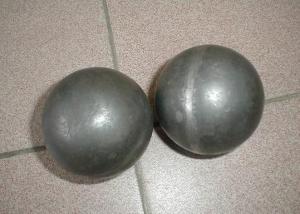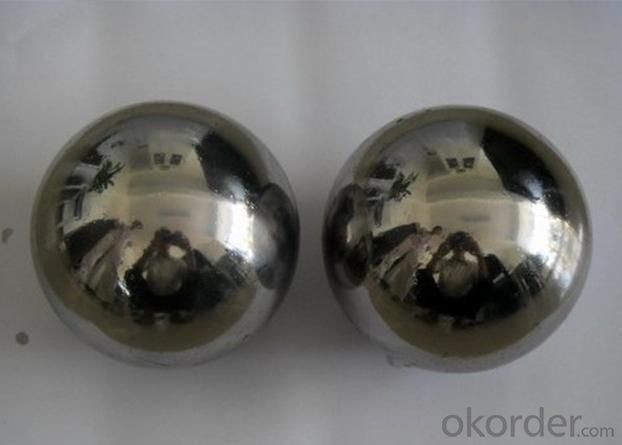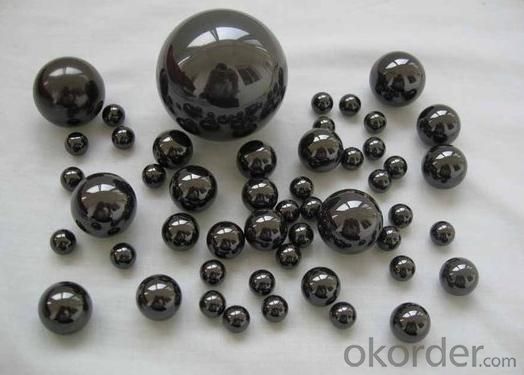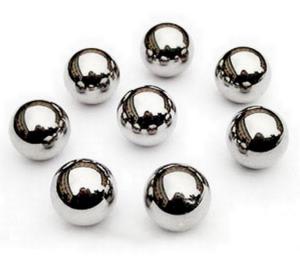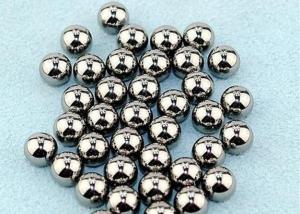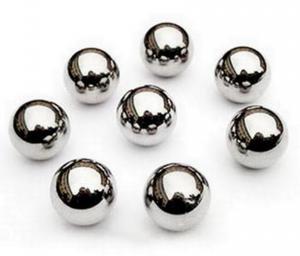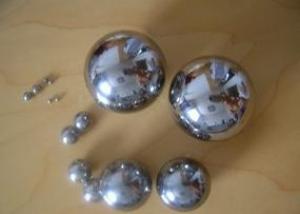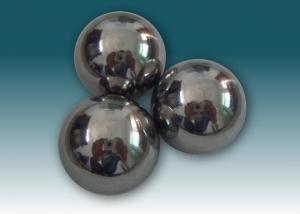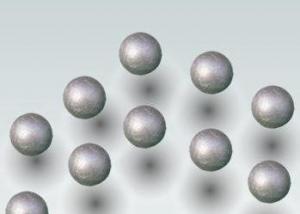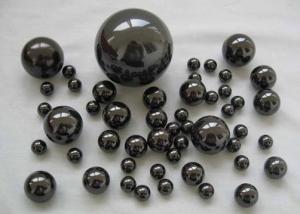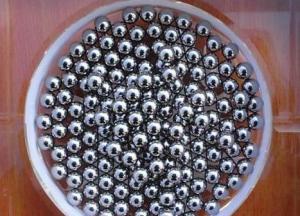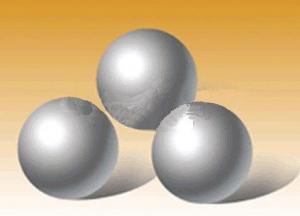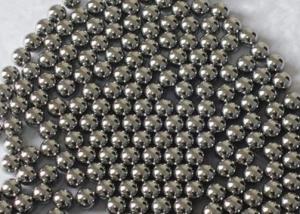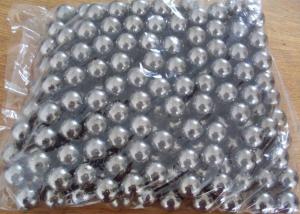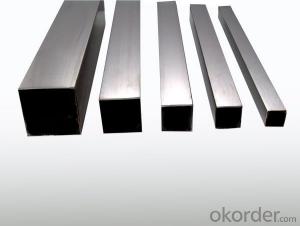304L Stainless Steel Ball
- Loading Port:
- China Main Port
- Payment Terms:
- TT or LC
- Min Order Qty:
- 5 Tons pc
- Supply Capability:
- 1000 Tons Per Month pc/month
OKorder Service Pledge
OKorder Financial Service
You Might Also Like
Stainless Steel Ball
MAIN PRODUCTS:
1. Material: AISI304, 316L, 420C, 430, 440C
2. Steel ball, with material AISI 1008-1086.
3. Chrome steel ball,with material: AISI52100
4. Flying saucer steel ball
5. Precision casting, including auto parts, machine parts, hardware handles, etc.
CHARACTER OF PRODUCTS:
1.The Grade of our products is from G10 to G1000
2.The dimension is from 0.5 mm to 25.4 mm.
3.The products from us are widely used in several industries, such as hardware, sliders, ball bearing lead screw, wheels, toys, bicycles, bearings, trust bearings pulleys, chemical industries, etc.
DETAIL SPECIFICATION:
|
Item |
SS304,316L,420C,440C Stainless steel ball |
|
Category |
Stainless Steel Ball |
|
Material |
AISI 420 430 440 SS304 316L |
|
Size |
0.5mm--25.4mm, 1/4",3/16",5/32",1/8",7/32",5/16",7/8",1" |
|
Grade |
G100-G3000 |
|
Hardness ( HRC) |
HRC58-65 |
|
Application |
Bicycle, bearing, pulley, slide, handcraft, shelf, luggage, hardware, grinding media |
|
Standard |
GB/T-308-2002, GB/T1148-93 |
|
Matched Standard |
DIN, JIS, ASME |
|
Certification |
ISO |
|
Packing |
Oily packing in pouch packing,plastic/tin box packing 1, 25kg/carton with steel pallet packing 2,25kg/carton without steel pallet packing 3,10kg/box then in wooden case packing 4,250kg/ steel drum packing or according to customers' requirement |
|
Place of original |
Shandong province, China |
|
Delivery |
Within 30 days or confirmed while placing order |
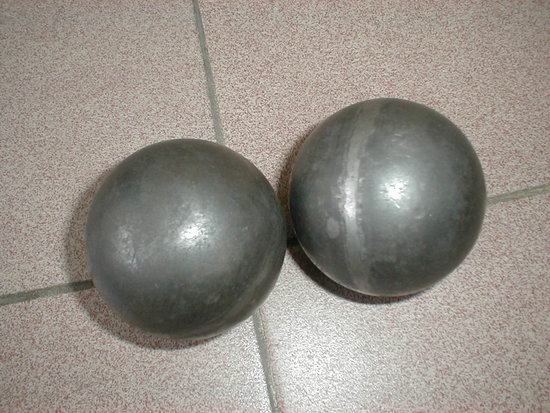
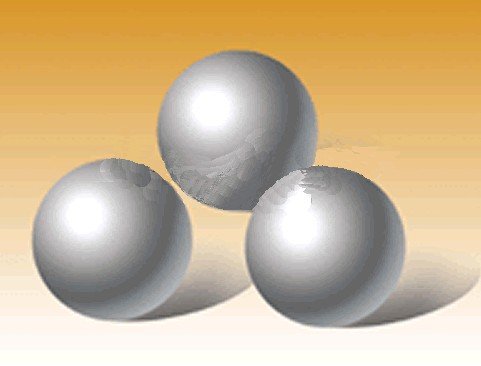
- Q: Are stainless steel balls resistant to acid corrosion?
- Yes, stainless steel balls are generally resistant to acid corrosion due to their high levels of chromium and nickel, which form a protective oxide layer on the surface. However, the level of resistance may vary depending on the specific type and concentration of the acid.
- Q: How do stainless steel balls perform in cryogenic storage tanks?
- Stainless steel balls perform exceptionally well in cryogenic storage tanks. Cryogenic storage tanks are designed to store materials at extremely low temperatures, typically below -150°C (-238°F). Stainless steel has excellent mechanical properties and is highly resistant to low temperatures, making it an ideal material for cryogenic applications. Stainless steel balls in cryogenic storage tanks offer several advantages. Firstly, they have high strength and toughness, enabling them to withstand the extreme conditions within the tank. This is crucial as cryogenic temperatures can cause materials to become brittle and prone to failure. Stainless steel's ability to maintain its mechanical properties at low temperatures ensures the integrity and durability of the balls. Secondly, stainless steel has excellent corrosion resistance, even at cryogenic temperatures. Cryogenic storage tanks often contain liquefied gases or chemicals that can be highly corrosive. Stainless steel's resistance to corrosion ensures that the balls remain unaffected by the harsh environment, preventing any degradation or contamination of the stored materials. Furthermore, stainless steel balls have low thermal conductivity, which is beneficial in cryogenic storage tanks. This property helps to minimize heat transfer between the stored materials and the tank walls, reducing the risk of temperature fluctuations or loss of cryogenic properties. The low thermal conductivity also contributes to energy efficiency by conserving the cold temperatures within the tank. In summary, stainless steel balls perform exceptionally well in cryogenic storage tanks due to their high strength, excellent corrosion resistance, and low thermal conductivity. These properties ensure the balls can withstand the extreme temperatures and harsh environments, while effectively storing and preserving materials in cryogenic conditions.
- Q: How do stainless steel balls compare to other types of balls, such as chrome steel or ceramic?
- Stainless steel balls stand apart from other ball types, like chrome steel or ceramic, in various ways. To begin with, stainless steel balls are renowned for their exceptional resistance to corrosion. This makes them perfect for use in wet or corrosive environments, as they are less prone to rusting or deteriorating over time when compared to chrome steel or ceramic balls. Additionally, stainless steel balls possess high hardness and strength properties. This means they can endure heavy loads, high temperatures, and intense impact without deforming or breaking. While chrome steel balls also exhibit good hardness and strength, ceramic balls are comparatively less durable and susceptible to cracking under extreme stress. Furthermore, stainless steel balls offer excellent dimensional stability, ensuring consistent performance even in changing conditions. This quality is particularly advantageous in precision applications where accuracy and reliability are paramount. While chrome steel balls and ceramic balls also provide good dimensional stability, stainless steel balls are often preferred due to their superior corrosion resistance. Moreover, stainless steel balls have a lower density than chrome steel balls, making them lighter. This advantage can be quite significant in certain applications that prioritize weight reduction, such as in the aerospace or automotive industries. On the other hand, ceramic balls generally weigh less than both stainless steel and chrome steel balls. Lastly, cost plays a crucial role in comparing these different ball types. Stainless steel balls are typically more affordable than ceramic balls but may have a higher price point than chrome steel balls. Therefore, the choice between stainless steel, chrome steel, or ceramic balls often hinges on the specific requirements of the application, including factors like corrosion resistance, durability, dimensional stability, weight, and budget constraints.
- Q: Can stainless steel balls be used in medical applications?
- Indeed, medical applications can make use of stainless steel balls. Stainless steel is a favored choice for medical devices and equipment due to its exceptional corrosion resistance, durability, and biocompatibility. In medical settings where cleanliness, sterilization, and long-term performance are vital, stainless steel is frequently employed in surgical instruments, implantable devices, and other medical applications. Stainless steel balls find utility in a range of medical applications, including ball bearings, valves, and connectors, offering attributes like high strength, low friction, and resistance to wear and tear. Furthermore, stainless steel possesses non-magnetic properties, rendering it suitable for applications that demand such qualities. As a result, stainless steel balls successfully fulfill the rigorous criteria set by medical applications and are extensively utilized in the healthcare industry.
- Q: Can stainless steel balls rust?
- Under specific circumstances, stainless steel balls may undergo rusting. While stainless steel is renowned for its ability to resist corrosion and rust, it is not entirely impervious to these phenomena. The occurrence of specific elements can initiate rusting in stainless steel balls, for instance, exposure to excessive humidity, salt, or chemicals. Furthermore, impairing the protective chromium oxide layer on the surface of stainless steel can also result in rust formation. Nevertheless, when compared to other steel varieties, stainless steel exhibits superior resistance to rust and generally possesses greater durability. To prevent rusting, it is crucial to properly clean and maintain stainless steel balls, ensuring they are shielded from harsh environments and corrosive substances.
- Q: How do stainless steel balls perform in high-pressure applications?
- Stainless steel balls perform exceptionally well in high-pressure applications due to their inherent corrosion resistance, durability, and high tensile strength. They can withstand extreme pressure conditions without deformation or failure, making them ideal for various industries such as oil and gas, aerospace, and automotive.
- Q: Can stainless steel balls be used in construction equipment?
- Yes, stainless steel balls can be used in construction equipment. Stainless steel is a durable and corrosion-resistant material, making it suitable for various applications in construction equipment, such as bearings, valves, and mechanical components.
- Q: What are the applications of stainless steel balls?
- Stainless steel balls have a wide range of applications in various industries. They are commonly used as grinding media in ball mills for the pharmaceutical, chemical, and food processing industries. Stainless steel balls are also utilized in the automotive sector for ball bearings, valves, and steering components due to their corrosion resistance and high strength. They find application in precision instruments like gauges, flow meters, and measuring devices. Additionally, stainless steel balls are used in jewelry making, decoration, and as ballast in various applications.
- Q: Are stainless steel balls used in flow control valves?
- Yes, stainless steel balls are commonly used in flow control valves. Stainless steel is a popular material choice for ball valves due to its corrosion resistance, durability, and high strength. These qualities make stainless steel balls suitable for various applications, including flow control valves. Stainless steel balls ensure smooth operation, reliable performance, and longevity in flow control valves, making them a preferred choice for many industries.
- Q: Are stainless steel balls resistant to chemicals?
- Stainless steel balls are generally resistant to chemicals, thanks to their corrosion resistance. This resistance is a result of stainless steel's high resistance to chemical reactions, which is due to its minimum chromium content of 10.5%. The chromium forms a protective oxide layer on the steel's surface, preventing any chemical interaction. Consequently, stainless steel balls are shielded and can withstand acids, alkalis, and solvents. However, it is important to consider that the level of resistance may vary depending on the type of stainless steel, as well as the concentration and temperature of the chemicals. To ensure suitability for a specific chemical environment, it is always advisable to consult the manufacturer or supplier of the stainless steel balls in question.
Send your message to us
304L Stainless Steel Ball
- Loading Port:
- China Main Port
- Payment Terms:
- TT or LC
- Min Order Qty:
- 5 Tons pc
- Supply Capability:
- 1000 Tons Per Month pc/month
OKorder Service Pledge
OKorder Financial Service
Similar products
Hot Searches
Related keywords
